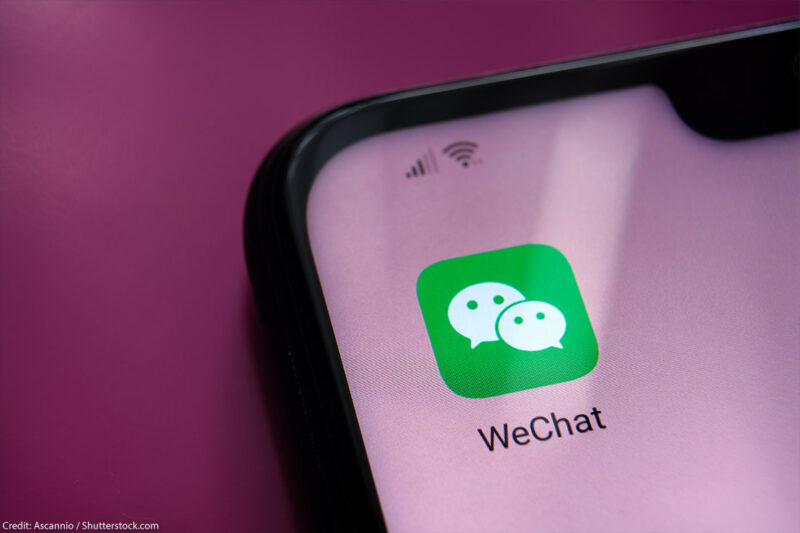The First Amendment Fight Against the WeChat Ban


Imagine waking up one day, unlocking your phone, and realizing that you could no longer send or receive messages through your favorite app. Or make or receive calls. Or scroll through your social media feed. Imagine that all of these functions were rolled into one essential app that you and your friends, family, and co-workers depended on, and that the U.S. government had decided to ban it.
That’s exactly what the Trump administration is attempting to do with WeChat, a communications app that millions of people in the United States depend on to connect with friends, family, and business contacts across the world.
On Friday, we and the ACLU of Northern California asked the Ninth Circuit Court of Appeals to block the Trump administration’s autocratic effort to ban WeChat. Our friend-of-the-court brief, filed in support of a group of WeChat users who have challenged the ban, explains why the administration’s actions violate the First Amendment.
The First Amendment protects our freedom of speech. It applies here because WeChat users depend on the app for a wide variety of speech and expression. Nineteen million Americans, primarily Chinese Americans, rely on WeChat daily to call and message with friends, family, and colleagues. The app is no ordinary communications tool: It’s also a platform for social media, news, money transfers, and e-commerce. It hosts an enormous community — more than one billion users worldwide — that simply can’t be replicated. For many of WeChat’s users, the app is their primary or only source of communication with friends and family in China, where the government blocks popular messaging platforms like Facebook, WhatsApp, and Instagram.
In August 2020, the Trump administration issued an executive order declaring WeChat a threat to national security. As we explained at the time, WeChat, like many U.S.-owned social media and messaging apps, including Facebook and Instagram, does collect broad categories of user data. Concern about how this data is used and protected is warranted. In the case of WeChat, there is also some legitimate concern about whether user data is accessible by the Chinese government. But the Trump administration made no attempt to address this concern in a way that would minimize interference with WeChat users’ speech, as the First Amendment requires. Instead, the administration’s stated goal is to make it impossible to use WeChat in its entirety.
After the coalition of WeChat users challenged the ban in court, the district court found that there were substantial questions about the constitutionality of the ban, and the court issued a preliminary order that prevented it from going into effect. The government then appealed that decision to the Ninth Circuit.
Our brief in support of the WeChat users makes two key arguments about why the government’s ban violates the First Amendment.
First, the ban prohibits people from speaking or expressing themselves before they can even do so. It’s what the Supreme Court has called a “prior restraint” on expression — one of the most serious and least tolerable infringements on First Amendment rights. Prior restraints are a greater threat to our rights than laws that prohibit or criminalize certain speech after it’s uttered. That’s because they prevent speech from happening at all. Here, by banning WeChat, the government is preventing all of the communications that 19 million Americans are having each day on the app.
It is a dangerous thing for any government to decide what people can or can’t say before they even say it. Governments can use that power against people whose opinions it does not like and wants to suppress. Or it could use a power like this in discriminatory ways, based on bias — a serious concern here.
Given these dangers, courts require the government to meet an exceptionally high burden when it seeks to justify this type of restriction on speech. The government must be able to point to immediate, irreparable harm from the banned speech, and its restriction on the speech must be as narrow as possible to prevent that harm from occurring.
The government’s sweeping ban on WeChat plainly fails that test.
In court, the government argues that its ban doesn’t implicate the First Amendment at all, because its actions were technically directed toward WeChat’s infrastructure, not the First Amendment-protected speech of WeChat’s users. But the government has acknowledged that its prohibitions will make the app unusable. And its legal argument ignores Supreme Court precedent, which makes clear that even when the government restricts speech indirectly, those restrictions can be prior restraints.
Second, even if the ban isn’t viewed as a prior restraint, it’s plainly a “total ban” — another kind of government action that, under the First Amendment, demands close scrutiny by courts. Where the government bans a medium of expression that is “unique” and “important,” courts require the government to meet a very high bar to justify the ban: It cannot suppress more speech than necessary to address the harm. In practice, broad bans like this one never pass that test.
Here, the government has banned an undeniably unique and valuable platform for users to express themselves. As the district court found, “WeChat is irreplaceable for its users in the U.S., particularly in the Chinese-speaking and Chinese-American community.” Because the government’s actions against WeChat suppress more speech than necessary, they violate the First Amendment.
With inauguration on the horizon, there may be reason to hope that the Biden-Harris administration will withdraw the WeChat ban. President-elect Biden hasn’t yet taken a public position on it, but given the high First Amendment stakes, withdrawal should be a no-brainer. In the meantime, we’re pressing for the First Amendment rights of WeChat users in court.


